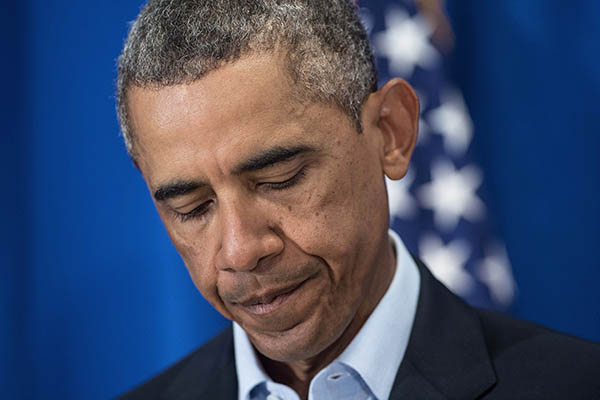
Nicholas Kamm—AFP
Critics of U.S. decision to send Special Forces into Syria say it is unlikely to make any difference against Islamic State militants.
U.S. President Barack Obama’s decision to send Special Forces to Syria is too little and too late, claim critics, who accuse him of lacking a strategy for the war-torn country.
After four and a half years of conflict that have left 250,000 dead and millions displaced, Washington says it will deploy elite U.S. commandos to Syria. But “fewer than 50” will be sent, and they will not be taking part in ground combat but instead will advise rebels fighting the Damascus regime, according to its announcement Friday.
Until now, Obama—a big skeptic of military intervention—had officially balked at putting U.S. boots on the ground in his effort to battle the Islamic State jihadist group. He opted instead to carry out airstrikes as part of an international coalition set up in mid-2014.
Strictly speaking, this will not be the first time that U.S. fighters have been on Syrian soil. Commandos have in the past carried out covert operations in bids to save hostages, and CIA agents have supplied weapons to rebels.
Even though the decision amounts to something of a U-turn for Obama, Republicans—both in Congress and on the campaign trail—remain unsatisfied, and other commentators too are critical.
“I think we have a president who just doesn’t know what he’s doing,” Donald Trump, the Republican frontrunner in the 2016 race for the White House, told CNN. Senator John McCain, also a former presidential candidate, said that, “unfortunately, this limited action is yet another insufficient step” taken by a president who “continues to have no realistic” and “coherent” strategy on Syria.
McCain, who is for U.S. military intervention abroad, also accused Obama of accelerating the “erosion of America’s credibility.”
Senator Lindsey Graham, meanwhile, said 50 special operations personnel were insufficient in number to intimidate I.S. “In fact, [I.S.] will see this as yet another sign of President Obama’s weakness,” he said. “Deploying a handful of U.S. special operations forces to Syria will not change this situation significantly,” said Frederic Hof, former special adviser for the transition in Syria at the U.S. State Department. “It is a Band-Aid of sorts, although a potentially useful one,” added Hof, who is now a senior fellow at the Atlantic Council think tank.
Both the White House and the State Department insisted Friday that the Syria strategy had not changed. Yet last month, in an interview with 60 Minutes on CBS, Obama had said “in a situation that is as volatile and with as many players as there are inside of Syria, there aren’t any silver bullets.”
“What we are not going to do is to try to reinsert ourselves in a military campaign inside of Syria,” the 2009 Nobel Peace Prize laureate had added.
In August 2014, during an often cited news conference, Obama admitted he did not yet have a strategy to combat the Islamic State in Syria. He then repeated tirelessly that he would not send U.S. troops into the country. And in September 2013, he had dismayed allies—France and the Gulf monarchies in particular—when he abandoned plans to strike Syria after accusing President Bashar al-Assad of violating a U.S. “red line” by using chemical weapons, once it became clear lawmakers did not support the action.
Today, as the Islamic State group controls a part of Syria and is proving resistant to the thousands of coalition airstrikes, U.S. Secretary of State John Kerry said Saturday that the move to deploy U.S. commandos was “not a decision to enter into Syria’s civil war.”
“It is not a decision or a choice focused on Assad,” he said. “It is focused exclusively on Daesh and on augmenting our ability to be able to more rapidly attack Daesh and do a better job of eliminating Daesh,” he added during a visit to Kyrgyzstan, using an Arabic term for the I.S. group.
However, Kerry refused to rule out more U.S. commandos being sent to Syria.
But Joseph Bahout, a visiting scholar at the Carnegie Endowment for International Peace, denounced what he called Obama’s “strategy of no strategy,” saying the president wanted to ease his conscience and give the illusion he was doing something.
